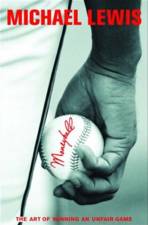

| Click on a book's image or title to order from Amazon.com |

Moneyball
W. W. Norton & Co., HC, © 2003, 286 pp, ISBN #0-393-05765-8Reviewed August 2003
Moneyball will not come as a revelation to many of today's baseball fans, who will be pleasantly surprised to see a book about the modern Oakland Athletics, but for many others it will be a wealth of information about how baseball really works. For those already in the know, though, they can content themselves with some fine storytelling, as well as a few nuggets of inside information about what Billy Beane and his front office really think.
Beane is the general manager of the A's, a team which has been tremendously successful over the last five years despite having an extremely constrained budget. They've done it mainly by throwing out much of the old-time baseball lore about how to win, and studying how teams really do with, using scientific methods and statistics. This lets them find players who are truly valuable to a team, but who are undervalued by other teams and thus are affordable to the A's.
The story starts and ends with Beane, who himself was a highly-regarded draft pick in the early 1980s, but who never lived up to expectations and who moved into the Oakland front office in the late 80s, eventually riding to become GM. Beane is a flawed human being (aren't we all?), but he has the stuff to make his position successful, and he also has the smarts to surround himself with smart people who are both on the same page regarding the organization's general approach, yet not afraid to bring new things to the table.
The A's have won by realizing that traditional baseball strategies such as "little ball" (bunting, base stealing, etc.) don't do much to win games. The most important job of a hitter is not to make an out. Power is also important. Defense is somewhat important. Everything else is of much lesser value. Pitchers, for their part, should be able to throw strikes, strike people out, and avoid walking people.
The crucial chapter of the book is about the 2002 amateur draft, where Beane finally educates his scouting staff and conducts a draft according to these principles, and according to the principles that what a young player has already accomplished is a better indicator of his skills than what he looks like or what the scouts imagine he might become (a heretical notion, according to Lewis). We won't see the results of this drafting approach for a few years, but it's a tantalizing glimpse at where the A's are going now. But the difference between the old ways and the new ways, and the degree to which tradition has frozen the evolution of the game, is striking.
However, Lewis is at his best telling stories. He focuses on three: Beane's odyssey through baseball is the biggest one. Then there are two players.
Scott Hatteberg was a decent catcher for the Red Sox in the late 90s, but after arm surgery he seemed washed up. The A's targeted him for his on-base skills, and moved him to first base. Lewis effectively conveys Hatteberg's pleasure at being wanted by someone after the 2001 season, and then his surprise and determination to make it as a first baseman. The strength and nature of his character really comes through, and you can't help but pull for the guy.
Similarly, pitcher Chad Bradford is just as endearing. A sidearm/underhand pitcher, he never had much stuff to work with, but got to the Majors on the strength of a dream and a quirk: He could throw underhand effectively (most pitchers throw overhand, or nearly so), and with surprising accuracy. The White Sox never knew what to do with him, never believed in him, but the A's traded for him and he became one of the best relief pitchers in the game. (He's something to see pitch, too!)
A sort-of chronicle of the A's 2002 season, Moneyball has it all: Reporting of baseball's cutting edge, great stories, and it should be accessible to even the casual baseball fan. I could pick one or two nits with some of Lewis' points ot emphases, but why bother? Any book will have a couple of warts, but this one's value shines through and once you're into it you're just happy to be along for the ride.
It's not to be missed.
hits since 28 August 2003.